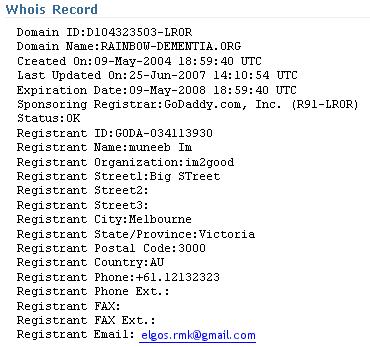I check the whois records for domains reasonably often. Whoisguard type systems are commonly in place to protect the identity of the domain owner. No problems there.
What irks, though, is the people who give completely false information… like this one where the info is incomplete and gives an Australian address yet I know that the actual owner is in India. By saying he’s in Melbourne he aquires a western credibility he perceives as superior to his Indian identity.

If other organisations can manage to send out letters with “authorisation” codes (for instance Google’s Adsense program) then surely it can be expected of domain registrars!
The first objections will relate to price… the cost of printing and mailing all those letters will cost in labour and materials. A small price to pay to have increased security and certainty on who we are dealing with elsewhere on the web.
Registrars will start refusing “overseas” customers
There may be the limitations on who you can buy domains from as companies like GoDaddy (from the example above) refuse to sell to people from India or Australia as the cost of mailing is higher than for local sales. Too bad, again the benefits out weigh the disadvantages.
Some domain registrars are small companies and don’t have the infrastructure to handle these processes. I don’t believe it would be terribly time consuming and it may force some of the cowboys out of the industry.
If these people were limited in the information they entered (and had their domains embargoed until it was authorised) the people who buy phishing and spam domains would be significantly restricted. I’m not so naive as to think that they wouldn’t use fake postal addresses and information (just see all the paypal verification fraud that goes on) but it would make life significantly harder and would create more of a paper trail for the authorities.
I completely agree.
As a genuine domain owner and trader, i “want” to be contactable in case something arises over one of my domains that’s why the contact info is correct and not blocked by Whois guard. However for the non-legitimate it really is the Wild West with no verification procedures.
What else would even work is phone verification like the Ebay system. When registering you must have a land-line and you get an automated phone call with a confirmation PIN and this must be entered to complete the Checkout.
This phone number would then appear on the Whois records and be non-editable by the user, unless of course you change phone numbers then another PIN would be phoned through to your new landline and the Whois will update accordingly.
It could be done a step further where the system does a reverse query on the number, and locks in Melbourne Australia as the domain owners origin should the landline originate from this locality.
This process would only add another 30 seconds to the domain checkout. The phone call would be quick, “Your domain security code is 1234”
It also wouldn’t require human resources as it’s run by a machine. It’s certainly not foolproof, but at least it provides a valid Country, State and a valid phone number where the registrant was located on the day the domain was registered.
I agree completely – in the world of online spammers and hackers (and this was reinforced by an article i read recently), people are becoming more and more aware of where they are buying products from online. With this in mind, people (even those with limited computer knowledge) are getting rather saavy to the whois records. After all, if your a quality business why would you need to hide your identity?
“By saying he�s in Melbourne he aquires a western credibility he perceives as superior to his Indian identity”
I’m not sure why this would ‘irk’ you. It only becomes relevent if and when you check the whois – and if you actually do that then you are savvy enough to know what it is. If western is perceived to be better in some way then that just shows how even the internet cannot break down barriers – surely it would depend on the quality of the website that was on the domain?
I would prefer it if all domain owner addresses were just hidden – do we really need to know them?
Yours
James.
Delhi.. no wait! ….UK! 🙂
It also means he has something to hide. I check the whois info of sites a lot – mostly to identify cheats, spammers and scammers. Having the information available is essential.
If I want to do business with a company I can look up their company information, see who the directors are etc. Having background information for a website is just the same.
However whois guards are available – so why lie?
Tha is cool.. Its wrong To impersonate or to hide the fact that he/ she is from another country. But matters less when the contnt is nuetral/ worth.
—
Vishnu
beautifulminds.in
I was just asked to verify the whois info for my domain. I note that they sound quite strict about it. I wonder if anyone has ever actually fallen foul of ICANN
I don’t understand..why people like to hide their identity with using the others address. It make many visitor confusing.
Why don’t they pay the hoster to hide their who-is ??
What about the entire issue of private registration? Doesn’t kinda make all this moot. You can’t even find out who owns the domain?
Hi Paul
With private registration you can still find out because the registrar knows – and there are legal avenues to request that information.
yes this is wrong…either go private or put the correct information